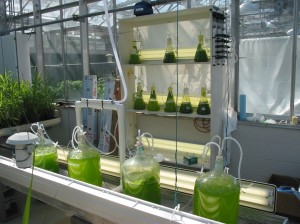From Ponds to Fuel Tanks: The Role of Algae in our Energy Future
By Sarah Galbraith, program manager of the Vermont Bioenergy Initiative
A great deal of interest about the potential of oil-rich algae as a bioenergy feedstock has surfaced in recent years. It’s already big business in certain parts of the world. In the United States, students, researchers, and innovators are looking for ways for algae production and processing to accomplish wastewater and nutrient management while also producing algal oil for fuel and algae for animal or fish feed.
Algae produces more than half of the oxygen on the planet, while consuming vast amounts of heat-trapping carbon dioxide and taking up nutrients like nitrogen and phosphorous to make biomass and energy. The lipids, or oil, that algae produce can be extracted and processed into renewable fuels such as biodiesel. Algae are an excellent source of oil for making biodiesel, which could displace substantial volumes of petro-diesel for heating and transportation. Microalgae reproduce rapidly, and they grow on non-agricultural land, so they do not compete with food, feed, or fiber production.
With funding from the US Department of Energy secured by US Senator Patrick Leahy, the Vermont Bioenergy Initiative has supported a number of algae to biofuel research projects. This early-stage research and development is determining the most viable and cost-effective methods for accessing algae’s commercial potential to produce clean renewable energy while treating wastewater and supplying nutrient-rich feeds and food.
Dr. Anju Dahiya, president of General Systems Research (GSR) Solutions, a recipient of grant funds from the Vermont Bioenergy Initiative, has been looking for high lipid algae strains, and scaling those up to a level that could be available for commercial use, especially for biofuels. “At GSR Solutions, we are looking at producing algae not just for biofuels, but combining it with waste water treatment and to produce other valued byproducts as well. This is very significant, because this would make algae production cost-effective. This would also help in nutrient recovery,” says Dahiya.
GSR Solutions will be assessing the feasibility of growing oleaginous algae strains in the company’s private lab in Burlington for up-scaling with waste streams from dairy farms and breweries. These strains will create a biodiesel product that is interchangeable with home heating oil, diesel, and jet fuel. In addition, the process can produce an organic fertilizer that can substitute for imported synthetic versions.
For more on the potential for algae to produce biofuels and other products here in Vermont, including videos, reports, an image gallery,and helpful links, visit www.vermontbioenergy.com/algae.
The Vermont Bioenergy Initiative is a program of the Vermont Sustainable Jobs Fund and partners with other organizations expanding the use of renewable energy in Vermont like Renewable Energy Vermont and the Energy Action Network. The Vermont Bioenergy Initiative also coordinates crossover with the Vermont Farm to Plate Network by providing resources and technical assistance to farmers, facilities, and communities to support energy crops to be grown alongside food production. www.VermontBioenergy.com









Leave a Reply